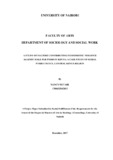| dc.description.abstract | Domestic violence is an endemic social problem in many countries around the globe with many reported cases of domestic violence against women. In the recent past however, there has been increase in cases of domestic violence against male partners. In Kenya, male victims of intimate partner violence have become a serious issues. Approximately, 3.8 women and 1.3 men per 1000 are victims of intimate partner violence each year. This translates to 1,181 women and 329 men are victims of intimate partner homicide. The purpose of the study was to determine factors contributing to increased domestic violence against men in Nyeri County, Central Kenya. The objectives of the study were to determine the influence of women socio-economic empowerment on domestic violence against men, establish the effect of illicit brew on the domestic violence against men and to examine the role of relative gender power relation in domestic violence against men. The study adopted a survey research design in which the target population was 87,000 households in Nyeri. The study sampled 211 respondents including equal numbers of both men and women. The data was collected using both questionnaires and interview schedules. Data was analysed both quantitatively and qualitatively. Quantitative data was analysed using descriptive statistics such as percentages and frequency distribution. Qualitative data was analysed using content analysis. The study established that the socio-economic factors such as taking over financial responsibilities among others influenced the increased domestic violence against men in Nyeri. The readily available illicit brew in the region which men have given themselves to excessive drinking thereby neglecting their responsibilities in the families was a major cause of increased domestic violence against men in Nyeri. Finally, the relative gender power relations such as the empowerment of the women by the law, economic empowerment, women in leadership among others have to some extent influenced the increased domestic violence against men in Nyeri. The study recommends that the county government of Nyeri to organize for seminars where men will be invited to be taught on the importance of taking up their full responsibilities in their families. The introduction of laws that will pass painful punishments both to the sellers and the consumers of the illicit brew with the view of controlling the consumption of the illicit brews in the County as to discourage men from the irresponsible drinking, hence engage in productive activities. Need for the government to focus on empowering both the men and the women so that no one sees himself/herself as better that the other. The government through local leaders such as the Chiefs and the religious leaders should sensitize the community on the need for peaceful co-existence. | en_US |



